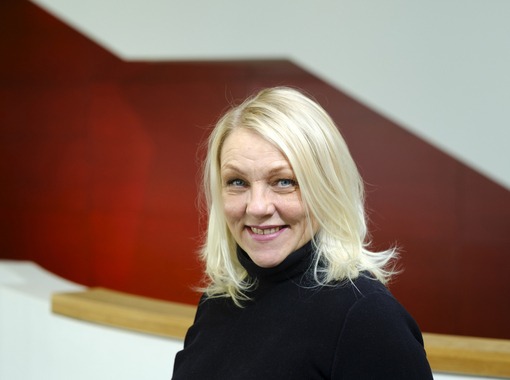The initial results from carbon dating sediment samples collected from the sea bed south west of the Reykjanes ridge this summer suggest that the sediment may be up to 40 thousand years old. This means that by analysing ancient environmental DNA (eDNA) from the samples, it could be possible to reveal details about the history of ecosystems around Iceland going back 40 thousand years.
The research cruise last June was organised by the Research Centre on Ocean, Climate and Society, ROCS, which is a forum for Danish-Icelandic scientific collaboration. Scientists from both countries were onboard the Marine Research Institute's vessel, Árni Friðriksson, and sediment cores were collected using specialised equipment. The team included researchers from the University of Iceland, the University of Copenhagen, the Geological Survey of Denmark and Greenland, and the Marine Research Institute.
Arndís Bergsdóttir, representing ROCS in Iceland, was among the scientists who set sail onboard Árni Friðriksson. She explains that the analysis of eDNA from the samples will provide essential clues about marine ecosystems thousands of years ago and how they have changed in the context of climate. The stated mission of ROCS is to map entire ecosystems and explore how they have varied in relation to climate change.
"We also want to look at the relationship between the marine ecosystem and Icelandic society, how changes to the marine biosphere and the climate have affected humans and vice versa."
Ancient DNA reveals the history of the biosphere thousands of years in the past
Arndís explains that the sediment cores are cut in two lengthways and just one half is used for analysis and further data collection. The other half is preserved by the Geological Museum in Copenhagen.
"When we collect samples to analyse eDNA, we are actually collecting data that reveals information invisible to the human eye," says Rebecca Jackson, a postdoctoral researcher at ROCS. Like Arndís, she was a member of the team on last year's research cruise and has recently been working to date the sediment cores and collect samples for eDNA research.
Arndís Bergsdóttir, representing ROCS in Iceland, was among the scientists who set sail onboard Árni Friðriksson. She explains that the analysis of eDNA from the samples will provide essential clues about marine ecosystems thousands of years ago and how they have changed in the context of climate. The stated mission of ROCS is to map entire ecosystems and explore how they have varied in relation to climate change.

"We are also looking at the core and recording in detail what we can actually see. For example, it's really interesting to look at the stratification and variations in colour and texture and think about what these mean."
Rebecca says that the differences in texture, colour and stratification observed when the cores were split to collect samples could provide clues about conditions at the time that sediment reached a certain area. "So it could provide important context for the results of the eDNA analysis."
See an interview with Rebecca about the project.
Huge amounts of research material collected
In total, ROCS researchers and the crew of Árni Friðriksson collected 17 sediment cores over the course of the two-week cruise. The samples have all been sent to the GLOBE Institute in Copenhagen for eDNA analysis.
ROCS research is largely based on interdisciplinary collaboration, something well illustrated by the fact that the team onboard Árni Friðriksson consisted of scholars from the natural sciences, the humanities and the social sciences. It is rather a novelty for people from such different academic backgrounds to work so closely together from the outset of a project. The cruise leader was Katherine Richardson, professor of oceanography at the University of Copenhagen and leader of the Sustainability Science Centre at the same university.




